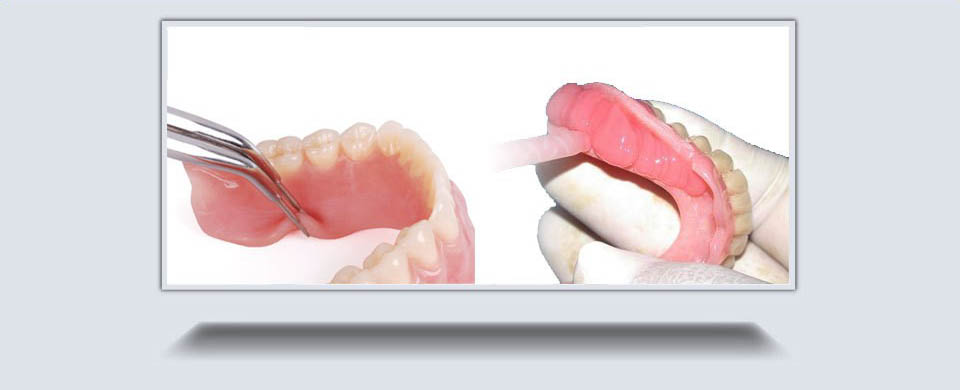Soft Liners
If you have been feeling pain in your gums for some time – if your denture hurts, even though it has been meticulously adjusted – soft liners may be a good solution for you. If you have noticed that your dental prosthesis (usually the lower denture) is becoming increasingly loose and uncomfortable, the soft base denture can solve these problems.
Generally, Raymond Kulik DD will place soft liners in a new or old denture in order to:
- Help improve the health of your gum tissues by absorbing some of the pressures of chewing.
- Help to determine the maximum retention possible by utilizing undercuts in the bone and gum which hard liners may not be able to accomplish without causing irritation. Soft liners will spring around these undercuts and allow for greater retention.
In summary, soft liners are for individuals who have a lower threshold for pain and/or their gum tissue overlaps jaw bone that is thinner than normal and does not resist pressure well. When such tissue is compressed between hard jaw bone and hard denture acrylic, pain is likely. Replacing one of these hard surfaces with a soft denture liner helps eliminate or reduce their painful tissue compression.
Temporary Soft Liners
If we find that temporary soft liners provide enhanced retention, we will then be able to determine if we should replace them with a more permanent type of soft liner in the future. Temporary soft liners (also called “tissue conditioners”) require special care and attention in order for them to produce the desired results:
- Do not remove the prosthesis from your mouth for the first 24 hours! The material that is placed in your denture will stay soft for the first 24 hours and will shape itself to your oral tissues.
- After the first 24 hours, you may remove the denture once every 12 hours for the first 2 days. At each removal, please rinse the denture with warm water only. Do not use any of the commercially available cleaners. The soft liner is still very fragile and may tear.
- During the next week you may remove the denture as often as you like, still keeping in mind that the liner is fragile and must be treated with care. The pink plastic and prosthetic teeth may be brushed gently, trying to avoid the soft liner.
- If possible, try not to use any denture adhesive. Since we are trying to ascertain the amount of available retention, adhesives may confuse the issue.
- For the first 24 hours, you should try to maintain a softer diet.
- We may be replacing this soft liner on a regular basis until your oral tissues heal adequately or we have determined that the retention for your denture is maximized and we can consider a permanent soft liner. (This process can take up to 6 months).
Permanent Soft Liners
Permanent soft liners serve a function similar to temporary soft liners. However, permanent soft liners are made out of a more durable material. They have a porous texture, so they’re not easy to clean. Waterdown Denture Clinic can recommend some very effective cleaning products. While permanent soft liners will generally last longer than a year, they should be replaced on an annual basis. The frequency of replacement depends on each situation and the patient’s oral hygiene habits.
Advantages of Soft Liners:
- Greater comfort (a significant number of denture wearers with chronic discomfort have experienced great relief).
- Clinical evidence indicated that almost everyone tolerates soft liner materials.
- Many denture wearers report that they can chew food more comfortably.
- A proven technology, soft liners have been offered to patients for more than 20 years.
Contact Us
Be sure to have your dentures and mouth checked professionally by your Denturist at least once a year to keep both in optimum health. Schedule your appointment with Raymond Kulik DD at Waterdown Denture Clinic.

NEW PATIENT FORMS
Simply download our forms and bring them in with you
FREE CONSULTATION
Book it NOW! or ask a question
BURLINGTON LOCATION
For your convenience, we can see you @Fielding Dental Healthcare

